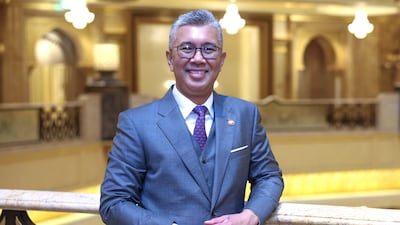Malaysia will start negotiations for a free trade agreement with the Gulf countries in May as the South-East Asian nation aims to further strengthen trade and economic ties with the six-member bloc.
The Gulf level talks will come after Malaysia signed a Comprehensive Economic Partnership Agreement (Cepa) with the UAE on Tuesday, coinciding with the visit of Prime Minister Anwar Ibrahim to the Emirates.
The Gulf trade deal “could surely take longer as there are six countries involved, whereas the UAE-Malaysia Cepa was done in record time within 11 months”, Malaysia’s Minister of Investment, Trade and Industry Tengku Zafrul Aziz told The National in an interview in Abu Dhabi.
The country will also host an Asean-Gulf summit in Kuala Lumpur in May as it looks to boost trade and investment with the region.
Malaysia, one of the fastest growing economies in the Association of South-East Asian Nations, has strong economic ties with the Gulf countries. Saudi Arabia is its largest trading partner in the region, and the UAE is its second biggest with a total trade value of $8.61 billion in the first 11 months of last year.
Total trade between the UAE and Malaysia registered a growth of 8.6 per cent on annual basis for the January-November period, according to the latest data provided by Malaysia’s investment, trade and industry ministry.

Malaysia’s exports to the UAE during the 11 months grew 3.4 per cent to $2.93 billion as a result of higher exports of electrical and electronic products to the UAE. Imports totalled $5.68 billion, up 11.5 per cent on an annual basis on the back of increased imports of crude oil.
“The signing of this comprehensive economic partnership agreement, or Cepa, will facilitate more trade and investment between the two countries, as companies will then have more access to each other's market and tariffs will be lower,” Mr Aziz said.
The UAE is aiming to sign 26 Cepas, with deals reached with countries including India, Turkey, Israel, Indonesia, Cambodia, Georgia, South Korea, Chile and Mauritius. Talks are under way with other countries, including the Philippines. On Tuesday, the UAE also signed a Cepa with New Zealand.
There are growing investment relations between the UAE and Malaysia, with Abu Dhabi’s sovereign wealth fund Mubadala Investment Company, Abu Dhabi Investment Authority, Masdar and DP World investing in sectors including oil and gas, ports and renewable energy.
In 2023, Abu Dhabi clean energy company Masdar signed an initial agreement with the Malaysian Investment Development Authority to invest $8 billion in renewable energy projects in Malaysia.
As part of the agreement, the two companies aim to develop up to 10 gigawatts of renewable energy projects by 2035, including ground-mounted, rooftop and floating solar power plants, onshore wind farms and battery energy storage systems.
Mubadala Energy, the oil and gas unit of Abu Dhabi’s Mubadala Investment Company also has investments in Malaysia.
Malaysia additionally aims to strengthen its co-operation with the UAE in artificial intelligence and other sectors of the digital economy. The country signed a preliminary agreement with Mohamed bin Zayed University of Artificial Intelligence last year to open an AI faculty in Malaysia, Mr Aziz said.
Malaysia offers investment opportunities as its economy continues to grow, with low inflation and a projected growth rate of about 5 per cent this year, he added.
“Inflation is low at 2 per cent, unemployment is low at 3 per cent and the interest rate is low as well, at 3 per cent. So we are seeing growth in various sectors,” Mr Aziz said. “Investments are record high. Last year, it was up close to 11 per cent.”
China and the US are Malaysia's biggest trading partners globally, while in investments the US is its biggest investor followed by China.


